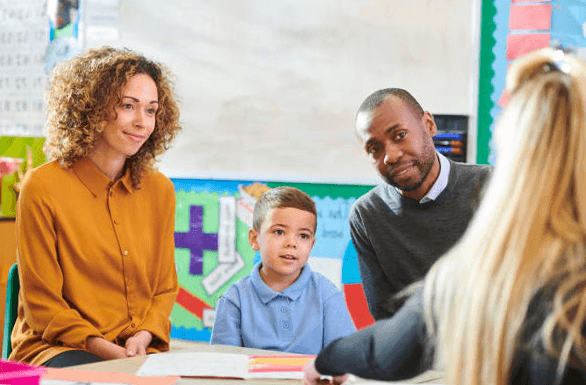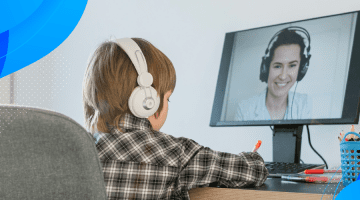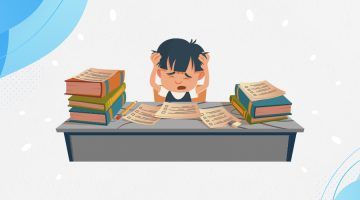Parent-Teacher Relationship
Updated on January 4, 2024
Involvement by parents in their child’s academic process is of great importance to the school. Why? For one, the relationship between teacher and parents can influence student achievement, emotional well-being, and personal development. But the advantages run deeper than that. This article aims to explore the significance of the relationship between teacher and parent for a student.
What Is the Parent-Teacher Relation?
The parent teacher relationship occupies a significant place in a child’s life. When a student has an equal line of communication with teachers, then the two can communicate and create good rapport at home or school. The two allies should always cooperate; what a parent knows best about their child may help the teacher treat the child better.
On their side, tutors understand a child’s problems since they are professionals and spend so much time with kids. If teachers and parents put all the information they’ve got on a child together, then it is possible to understand that particular child. They will find better ways of helping children progress toward their goals in life or develop them into whatever becomes natural for them — a doctor, artist, or even plumber.
1:1 Math Lessons
Want to raise a genius? Start
learning Math with Brighterly
 Let’s start learning Math!
Let’s start learning Math!
Importance Of Teacher Parents Relationship
An effective relationship between teacher and parent is crucial and always helps your child. Before they enter formal schooling, parents are the first to go to school and educate children. Once parents start working with teachers, their cooperation can help accelerate a child’s learning and development.
Teachers and parents cultivating warm, trusting relationships with each other is the very best thing for a child. It forms a firm basis for further study. Children can see their parent’s relationship with teachers as a model for future dealings with adults. By a good example, not only will they come to understand respect and manners, but skills will be cultivated.
Parents and teachers can work together to encourage students to raise their standards. They can do so by having a system whereby students are held responsible at home and school. For example, children can fill in their core math homework charts as they complete the assigned tasks. Teachers and parents encourage or reward kids with prizes, parties, stickers, and fun day trips to motivate them to succeed.

Advantages Of The Parent Teacher Relationships
Working together, the teacher and parent can help students along. The following are the ways that this connection can assist students:
Students Will Invest More In Their Classroom Accomplishments
If teachers and parents collaborate closely, students will uniquely trust their teachers. The two parties will take care of them and begin to contribute their share to the partnership.
Teachers and parents working together help students realize the two parties’ investment in their growth. Thus, students will work even harder to reach academic goals and won’t let their teachers and parents down.
Students will also likely develop a sense of respect for their teachers, seeing how much the latter show their parents. Home-school lives will also become exciting as students and their parents talk about all kinds of things going on in the classroom. Parents will also be part of their kid’s school life, especially when parents look forward to celebrating the successes on behalf of their children.
1:1 Math Lessons
Want to raise a genius? Start
learning Math with Brighterly
 Let’s start learning Math!
Let’s start learning Math!
Greater Wins
Students’ wins are more valuable. Parents and teachers work together to celebrate success. Each side will be proud of their role in winning awards, getting scholarships or college acceptance, or raising grades. This priceless moment shows how teachers, parents, and students contribute to the win.
Cultural Insight
With parent-teacher affairs as its platform, cultural exchange extends from educators to parents and among students. It creates a rich and multifaceted platform for learning where students learn from each other with all their might.
Enhanced Support System
Meanwhile, beyond the immediate academic assistance, this cooperative effort provided a web of emotional and social support. This way, the network can expand, and parents can help each other. Parents in a community who understand and share the hardships of raising and educating children are formed around such networks.
Personalized Learning Through Strengths
Taking it a step further, personalized learning by strength means acknowledging academic potential and including non-traditional gifts. It could be artistic, athletic, or even associated with problem-solving skills. Finding and cultivating these hidden strengths insignificantly enhances a child’s personality.

Community Engagement
The idea of community engagement is extended. Teachers and parents can collaborate to participate in events that include the larger community. Such cooperation could be linked with local firms, community heads, cultural organizations, and a richer educational ecosphere.
Efficient And Easy Problem-Solving
The close parent teacher connection makes it easier for them to discuss complex subjects. Teachers can report to parents the problems a student is having without fear. Furthermore, the conviction that if they encounter any problem, their parents and teachers will help them overcome it means children face less anxiety. Because they trust each other, the team can work harmoniously to find a concrete solution.
Struggles Of The Parents And Teachers Relationship
Establishing a good relationship between teachers and students’ parents requires the two sides to overcome some struggles that may prevent them from helping a student. Here are some of the potential problems:
Lack Of Parental Understanding
There may be some difficulties for teachers getting parents and families up to speed. The latter may not recognize the need for parent or guardian involvement nor regard it as a significant problem. When a kid reaches a certain age, many parents think there’s no need for their child to be involved.
Several parents and guardians feel they cannot add anything to their child’s education. As a result, teachers may need some time to get them up and running (and working together).
Parental Involvement Stigma
But to go further into the stigma, one must look at how society’s expectations and gender roles affect parenthood. Overcoming these obstacles needs personal efforts and a social change in attitude.
Transition Points Impact
This is especially true at critical academic turning points like the move from elementary to middle school. Recognizing the particular problems at these crossroads and setting up selective support systems is essential to maintaining a sound teacher parent relationship.
Busy Schedules
Parents are busy with work and may not have time to come in on a given appointment day. Some don’t have much time to leave their kids before they go off. With limited time to be concerned about their child’s affairs, a parent will find it hard for them and any teacher they choose to start such a connection.
Lack Of Trust, Respect, And attitudes
If a parent’s perception of their child’s school is off base, this trust and respect may be compromised. A parent not confident in a teacher’s abilities would likely be uninterested in conversations about her daughter’s wellbeing and will cooperate poorly.
By contrast, a teacher’s attitude towards a parent can inhibit the latter’s desire to collaborate. For instance, when teachers develop a negative attitude toward a parent, they will not even consider communicating with them if the child has issues. This can also mean a higher dropout rate.
Conclusion
The close teacher and parent relationship helps improve a student’s learning experience in school and encourages a culture of concern. Under such conditions, everyone involved is not only found wanting; they also actively seek the children’s wellbeing. As a result, a mutually supportive educational community is created in which students not only experience academic success but also feel an overwhelming sense of happiness and satisfaction at school and home.











